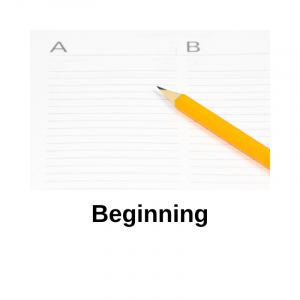6 Grammar Basics
Brief Introduction
Traditional or prescriptive grammar tends to focus attention on parts of speech or classifying individual words (see previous Chapter 5), whereas functional or descriptive grammar centers on the way these words work together. The word grammar means more than using the right words in the right way. When we understand the rules of language, we become independent users, rather than always memorising specific usages[1]. There are many excellent grammar resources available in book and online format; this is not intended to be a complete guide, only a brief introduction.
Functions
There are four main sentence types – statement, exclamation, question, and command. Sentences are made up of smaller parts we call clauses and there are two different types of clauses. (Click on each bold font word for a definition)
Independent Clause
An independent clause can stand on its own, hence the name. It must contain a subject (who or what) and a verb (an action being performed by the subject), for example, it can be as simple as – The rain fell on the window (Subject underlined and verb italicised). All simple sentences are independent clauses. Independent clauses can be joined together, using conjunctions, to form more complex sentences (see previous Chapter 5 for conjunctions).
Dependent Clause
A dependent clause, also called a subordinate clause, relies on the information in an independent clause to make a complete meaning.
For example, let’s use our previous sentence and add additional information – The rain fell on the window in great cascades.
The original sentence and its meaning is still intact, though the final three words are dependent upon the independent clause for their meaning. The preposition ‘in’ indicates in what manner – ‘in’ the current setting or circumstances already indicated by the independent clause. The noun phrase (or group) ‘great (adjective) cascades (noun)’ adds additional information to the independent clause. The introduction of a second noun does not cancel out the subject of the sentence; the dependent clause ‘borrows’ the subject of ‘rain’ in order to make the sentence’s meaning clear.
How do I identify a clause?
As we are already aware, words are not used in isolation and rely on each other for making meaning. When trying to identify a clause, firstly look for the verbs or verb phrases in the sentence, then ask yourself who or what is performing the action in the sentence.
For example – The student was studying in the library. Studying is the main verb and was is an auxiliary verb that modifies the meaning and provides the ‘When’ – past. Now ask ‘Who’ is doing the studying, and this will indicate the subject of the sentence – The student. ‘The student was studying’ is an independent clause; it makes sense on its own. ‘In the library’ is a dependent clause that adds additional information though would not make sense on its own.
Therefore, in a verb phrase or group the main word is always a verb and this is often preceded by an auxiliary verb that modifies the action. All Major Word Classes can be categorized into Word Groups (see below for further examples).
Word Groups
| Word Group | Structure | Example |
| Noun group | The main element is a noun and it is often preceded by an article – the, a, an
It often contains an adjective, used to describe the noun A third person pronoun can also be used |
The soldier stood his ground.
Even now the old woman remembers. He insisted on going to the café. |
| Adjective group | The main element is an adjective and it is used to modify the meaning of a noun or noun phrase | He had extremely blue eyes.
She wore professional looking clothes. University provides an excellent educational opportunity. |
| Verb group | The main element is a verb and may contain auxiliary verbs to modify the action | She went running yesterday.
They would later encounter their lecturer. The boy was hugging the dog. |
| Adverbial group | The main element is an adverb and provides extra details about events, such as how, when, why, or where
A preposition combined with a noun group |
The football team were simply told to take the field. (how)
He travelled after midnight. (when) To better understand, ask questions regularly. (why and when) The captain stood in the middle of the field. (where) |

In the activity below you will find three simple sentences broken into two phrases. Each has an independent and a dependent clause. Click, drag, and drop the clauses into the correct field and then check your answers.

has a declarative function
has an exclamitive function and is usually followed by an exclamation mark
has an interrogative function and is usually completed with a question mark
has an imperative function; giving an authoritive command; essential or urgent
a group of words including a subject and a verb
A small group of words standing together as a conceptual unit; typically forming a component of a clause, e.g., noun phrase - "red car"
the main verb or lexical verb of the clause; expresses an action
always precedes the main verb and modifies it

